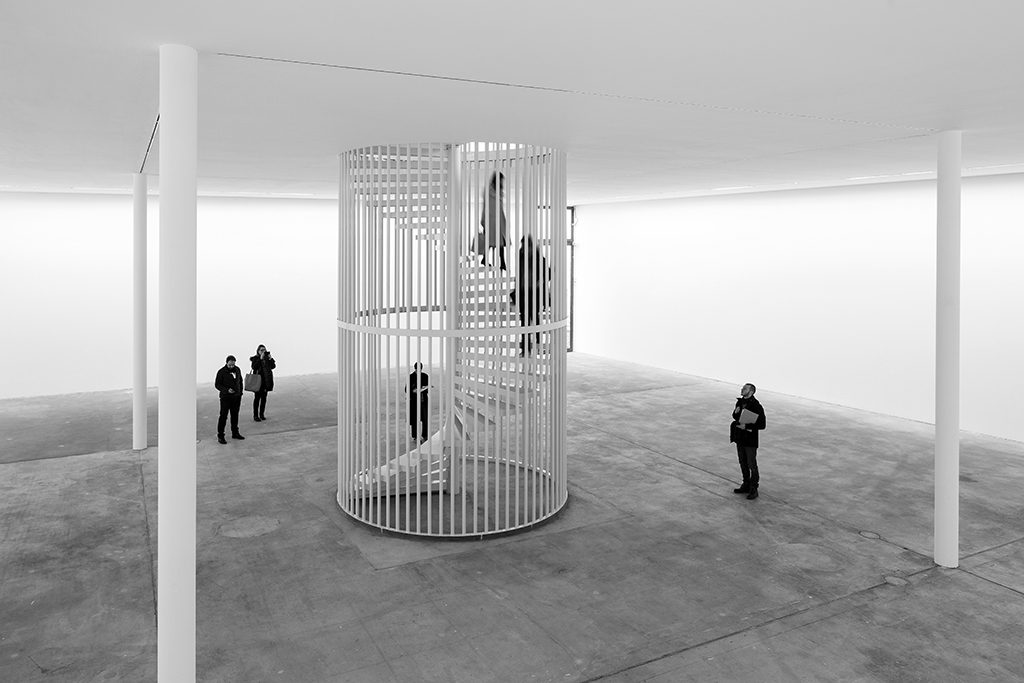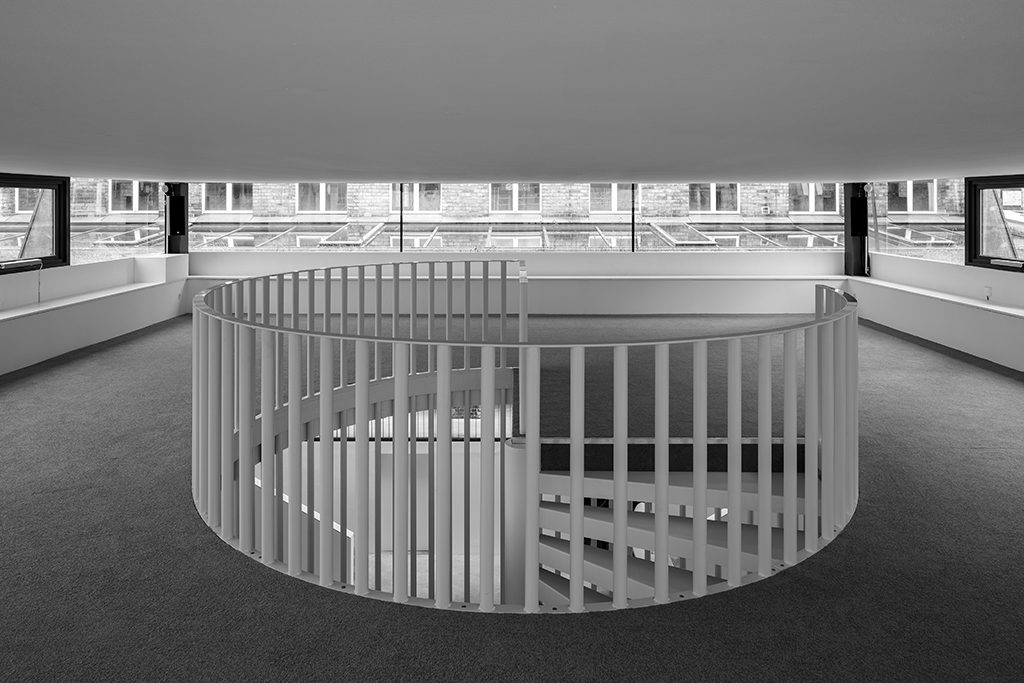The Poetics of Self-Help
Hanne Lippard: Flesh
KW Institute for Contemporary Art, Berlin
20.01.17 – 09.04.17
An exposed spiral staircase. A countdown and a question. Little else exists in this ascension. Trapped in the square room floating above, under a low ceiling and a beige carpet, a voice gently speaks. It is the voice of Hanne Lippard, but it might as well be from a nature documentary, so clear and informative, so precise, so soft. Here we are, in this barren room, waiting, listening, reflecting.
How do you see yourself in ten years?
She asks. Her voice circling the space. You close your eyes, trying to answer the question. Meanwhile the voice persists. Can it be that the one who asks the questions also has the answers? Before we’ve delved in too far, it ends. And once more we find ourselves in this small chamber, the words echoing in our heads, our bodies more present than before. This is the poetics of self-help. Flesh represents the opportunity for us to find ourselves, to decide on our future, to contemplate our career choices. In between a series of questions there are constant instructions. The voice asking and demanding that we listen, that we follow, but where does this leave us? Nowhere? Empty? Perhaps.
There is a serious undertone to the lightness of this work. We know this language. You hear it all the time and everywhere. Yet in this context its meaning is transformed. Instead of helping us, Lippard’s craft poeticises the emptiness of these forms. Taken, stolen and consumable, the language in Lippard’s poem exists in your Twitter feed, on posters, in advertising, in television, radio and text messages and in your yoga class. The very vernacular of everyday conversation punctuated by a reverence for the self-rewarding, self-prophesising habits of capitalism.
How can I
Earn 100 euros in 1 minute?
Earn 200 dollars in 2 minutes?
Earn 300 pounds in 3 minutes?
As such, the beautiful tall staircase which carries us into the chamber takes on new meaning. Its transcendent beauty emblematic of the false glamour of career incentives. ( We all wish to climb the ‘career ladder’. ) This idea compounded by the austere room we find ourselves in. The austerity an obvious nod to the reality of the current political climate. Promise and hope, met by a defining sweep of defeatism and failure. Lippard is the voice of reality: job-hunting, cover-letter writing, interviewing, working in corporate culture and seeking leisure in every nook and cranny possible. The reality being, that there is no conclusion, that there are merely empty plateaus and hollow rooms. She lets us know, ‘We need help’. This is not a new story: from the Tower of Babel to any kind of pyramid scheme, where there is hope there is always tragedy, especially when dealing with the nature of language. Lippard’s piece compounds the helplessness of existence. She wishes to be your counsellor, but instead becomes the hypnotist, enabling your confusion and disorientation.
This is not my first experience of Lippard’s work. I have seen her perform multiple times. Each time, her computer-like voice capturing the inner conscience I’d rather ignore. However, there is a certain lack to this noise, a lack of passion, a lack of self. And this lacking can often make you feel disconnected from the work. At times, you want something that speaks for you, that takes over and completes you, such as you might find at a music concert or in a theatre. Lippard actively goes against this. She positions herself nowhere. Existing as a kind of ethereal cloud of words and presence. The constant, never changing, rhythm of her voice, becomes something more than her, more than all of us. Instead we become interconnected. Everyone in the room is one and the same. Our identities are stripped, leaving us just as figures in space, feeling and breathing. Or as Lippard says:
As a body
As anybody
As many body
As a nobody
As one’s own body
As an unknown body
As unknown to anyone
As anyone to anyone
As annoying to everyone
As unknown and alone
Flesh represents Lippard at her most provocative. Sitting alone in a room elevated high above the gallery we attend a consultation with her. Some people might say it’s too long. Thirteen minutes of non-visual interaction. Again, you feel there is a sense of purpose in this choice. Do we truly lack the concentration? Or are we afraid that what Lippard is saying is so pertinent that it’s hard to listen to? I stayed for a second listening. In the end, I was left feeling more aware of my failure than before. More aware of my body. More aware of my place in society. We make many demands on ourselves. And culture itself seems littered with similar concerns: search YouTube for motivational speeches, and you will find thousands! Or the notifications from apps such as Headspace, giving you daily guidance, making you feel good. When it comes to contemporary culture, self-development is at the peak of our concerns. There are moments in the piece where the voice moves around the four channel speakers individually, and in these moments, we strain to chase it. Chasing Lippard’s voice is like chasing our dreams: no matter how close we feel, it is always moving away from us, beyond us, and driving us somewhere other than where we expected. It takes the reality of the modern world and holds it up as a mirror, dissecting the gloss. Once I had reached the climax, I can only say she helped me to ask the questions I was avoiding in my life. Filling us with feeling and sourcing our most feared emotions. Ending full circle with the same question that we began with, but a different answer.
Where do you see yourself in ten years from now?
pause
DESCRIBE WHAT YOU DO IN FIVE LIVES
1. IT
2. IT’D
3. ID’T
4. IT DIDN’TDNDDT
5. IT DIED
What might seem underwhelming about this work is the very thing that defines it. In inverting the escape route, Lippard’s piece takes you on a short journey to your centre, and to the centre of your environment. Existence is important; through language we find meaning. Yet Lippard takes language that has no meaning, and by listening closely to that language she deciphers its semantics, and finds poetry as a result. That is the gift Lippard wants to give us. That is the gift we are left carrying. And while giving is a gracious act, in this instance we are left burdened by ourselves and our own self-criticisms. I feel Lippard wants us to help ourselves, without judging us, or by showing us something we didn’t know before. She suggests that we know all we need to know already; we just need to ask the right questions of ourselves.
自助的诗学
《汉娜· 利帕德:血肉》
柏林工场当代艺术中心
2017 年1 月20 日 – 2017 年4 月9 日
译/ 黄晔丹
一座裸露着骨架的螺旋阶梯。一场倒数和一个问题。拾级而上的过程中除此无他。整个装置被困在一个漂浮其上的方型房间与低矮的天花板及一张米色地毯之间。耳畔传来轻声的录音旁白, 这是艺术家汉娜· 利帕德本人的声音,但也可能是来自某部自然纪录片,如此清晰而又详实,如此精确而又柔和。我们到了,就在这个房间里,等待, 聆听, 思考。
“你如何看待十年后的自己?”
旁白里的女声问道。其声音萦绕着整个空间。你闭上双眼, 试图回答这个问题。与此同时,这个声音持续着她的提问。提问者本人是否会有答案呢?然而,就在人们钻研其中的时候,声音戛然而止了。而观众再一次发现自己身处这个狭小的房间内,刚才那个问题比先前更清楚地在他们的头脑及体内回荡。
这是自助的诗学。这件题为《血肉》 ( Flesh ) 的装置作品为观众提供了一个机会,让他们能够发现自己, 为自身的未来做决定,并反思其职业选择。在一系列的问题之间,不断穿插着相应的指导。旁白的声音持续要求人们聆听并跟从,但最终会把他们带到何处?无处可寻?空无?或许吧。
透过这件作品的表象,背后实有深意。作品旁白运用是众人都明白, 随时随地都会听到的词汇。然而,放在作品所设的情境中, 其意义就发生转变了。与其说是协助观众理解作品,不如说是利帕德的技法令这些形式上的空洞也变得诗意起来。她在旁白中所用的语言同样也存在于你我的推特消息, 海报, 广告, 电视, 广播, 短信及瑜伽课上。在那直白的日常对话中,字里行间流露出对惯于自我嘉许, 自我预言的资本主义的仰慕之情。
“如何才能让我
在一分钟内赚取一百欧元。
在两分钟内赚取两百美元。
在三分钟内赚取三百英镑。”
由此,这座高大美丽, 可以将观众引至楼上小房间的阶梯被赋予了新的涵义,其精妙绝伦的外观象征着职称奖励的虚伪魅力 ( 人人都希望能够爬上“晋升阶梯” ) 。与这一意象并存的是楼上房间所带来的压迫感。这种压迫感无疑是当前政治形势的真实反映: 承诺与希望被失败主义一扫而空。在作品中,利帕德就是现实的代言人:找工作, 撰写求职信, 面试, 供职于某家企业, 争取每个可能的机会忙里偷闲。而现实就像是一片苍茫的高原和空洞的房间 ( 当然孰是孰非并无定论 ) 。艺术家想借此让观众知道,“他们需要帮助”。这种立意并不算新颖:从巴比伦登天塔到任何一种金字塔,都在阐述“福兮祸之所倚”的道理,在处理语言的本性上尤其如此。利帕德的作品道出了生存的无助感。她希望能够成为大众的咨询师,但结果却变成了催眠师,加剧了人们的困惑与茫然无措。
这并非是我首次接触利帕德的作品。我曾多次欣赏过她的这件作品。每次她那如同电脑合成一般的声音都抓住了我想要忽视的内心意识。然而,她的声音缺少了某种热情和自我。而这种缺失往往使人与作品失去连接。很多时候,我们想要找到为自己说话, 能够接管并成全自己的某样东西,就像我们在音乐会或剧院里或许可以找到的那样。利帕德却反其道而行之。她并没有把自己安置在她的作品中,而是如同一片空灵的云朵驾临于文字与存在之上。她那一成不变的音调超越了她自己和在场的所有人。人们因此而开始互相连接,在展场里的每个人都合为一体。人们的身份被剥离了,变成组成整体的一个个个体而感觉着,呼吸着。或像利帕德所说的:
“如同一个人
如同任何人
如同许多人
就像一个无名之士
就像一个人自己
就像一个名不见经传的人
就像不为任何人所知
仿若路人甲乙丙
仿若被每个人所厌弃
仿若独自一人的无名小卒”
《血肉》一作代表着利帕德对世人的最大挑衅。观众独自坐在一间凌驾于画廊之上的房间内,接受艺术家的心理咨询。有人可能会说这场历时十三分钟的非可视互动时间太长了。人们再次感到这样的选择有其目的性:我们真的缺乏专注吗?抑或是担心利帕德所说的太过切题以至令人难以接受?我留下来又听了一遍。最后,我离开的时候比以往更加意识到自己的失败, 自己的身体,以及自己在社会中的位置。人们对自己有诸多要求。而文化本身似乎也遍布类似的关注,就像在YouTube 上搜索“激发性的演说”,可以找到上千条链接;或像手机冥想程式HEADSPACE 向受众发送通知,指导他们的日常生活,令其自我感觉良好一样。而在当代艺术领域,自我发展也是人们最关注的课题。在《血肉》这件作品中,有些时候旁白的声音会选择从 不同的四声道音箱中单独播放出来,令观众费力地追寻声源。追寻利帕德的声音就像追逐人们自己的梦想,无论感觉有多么接近, 梦想总会远离, 超越,并把人们带到出乎预料的某处。


Hanne Lippard, Flesh , 2016. Installation view, KW Institute for Contemporary Art, Berlin, 2017. Courtesy the artist and LambdaLambdaLambda, Prishtina. Photo: Frank Sperling. 汉娜· 利帕德《血肉》, 2016。装置展示现场,柏林工场当代艺术中心, 2017。感谢艺术家以及普里什蒂纳LambdaLambdaLambda 画廊。摄影: Frank Sperling
该作品取材并借鉴当前社会的现实生活,剖析那些长久被掩饰的东西。不得不承认,艺术家帮我问出了平日生活中避而不谈的问题,令人充满感性,并寻找自己最不敢面对的情绪之源头。录音旁白的最后又回到了开场白时的那个问题,但得到的答案却是不同的。
“从现在算起的十年之后,你会发现自己身处何方?
【停顿】
描述你在五世生命中的所做所为
1. 它 ( IT )
2. 它要 ( IT’D )
3. 要它 ( ID’T )
4. 它不…… ( IT DIDN’TDNDDT )
5. 它死了 ( IT DIED ) ”
这件作品最令人印象深刻的可能就是给它下定义的那样东西了。通过倒置逃生通道,利帕德的《血肉》让人踏上一段短途旅程, 回归自身及所处环境的中心。存在是重要的,通过语言可以找到意义。然而,利帕德却选择那些没有意义的语言,通过用心聆听, 将其语义解码,并最终找到语言中的诗意。那就是利帕德想要给予观众的礼物,也是观众所要牢记在心的。给予是一种高尚的行 为,与此同时,人们在这种情况下也被迫背负上自身及自我批评所赋予的重担。我觉得利帕德想要人们自己帮助自己,没有批判, 也没有向大家展示他们过去所不知道的。在她看来,每个人都早已知晓自己所要知道的一切,只需向自己问对问题就行了。